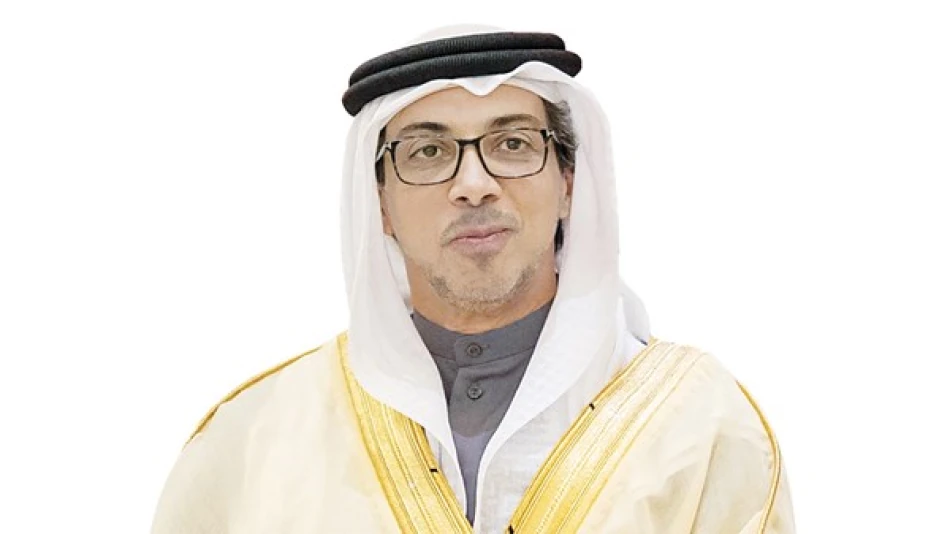
Abu Dhabi Hosts 'Global REIT 2025' Conference under Mansour bin Zayed's Patronage
UAE Positions Itself as Global Rail Hub with $38 Billion Investment Push
The UAE is leveraging its strategic position as a logistics powerhouse to capture a larger share of the global rail market, as Abu Dhabi prepares to host the second edition of Global Rail 2025 from September 30 to October 2. With the country's $13.6 billion national railway program already underway and global passenger traffic expected to reach 9.5 billion by 2025, the Emirates is positioning itself at the center of a transportation revolution that could reshape regional connectivity and climate goals.
A Strategic Bet on Sustainable Transportation
The timing of Global Rail 2025 reflects the UAE's calculated move to establish itself as the Middle East's transportation hub. Sheikh Nasser Al Qasimi, Assistant Undersecretary for Infrastructure Regulation at the Ministry of Energy and Infrastructure, emphasized that the government launched its National Railway Program in 2021 with investments totaling 50 billion dirhams ($13.6 billion) – the largest land transport system in the country's history.
This massive infrastructure push aligns directly with the UAE's Net Zero 2050 commitment, positioning rail transport as a cornerstone of the country's climate strategy. Unlike road transport, railways can significantly reduce per-capita carbon emissions while handling the region's growing logistics demands.
Market Dynamics Signal Major Opportunity
The numbers tell a compelling story for investors and industry players. Ahmed Al Musawa Al Hashemi, CEO of Hafeet Rail Company and Executive Committee Chairman of Global Rail 2025, projects global passenger movement will hit 9.5 billion travelers by the end of 2025. The participating companies at this year's event represent combined annual revenues exceeding $140 billion, indicating serious capital deployment in the sector.
The exhibition has expanded significantly from its inaugural edition, now featuring country pavilions from Austria, Germany, Spain, Jordan, Poland, Qatar, South Korea, the United Kingdom, and India. More telling is the participation of delegations from emerging markets including Afghanistan, Chad, Kenya, Paraguay, South Sudan, Turkmenistan, Uganda, and Uzbekistan – regions where rail infrastructure development could unlock substantial economic growth.
Regional Competition and Global Positioning
The UAE's rail ambitions mirror similar infrastructure drives across the Gulf. Saudi Arabia's NEOM project includes advanced rail systems, while Qatar expanded its rail network ahead of the 2022 World Cup. However, the Emirates' approach differs by emphasizing international connectivity and logistics integration rather than purely domestic transportation.
This strategy echoes Singapore's successful model of becoming a regional hub through strategic infrastructure investment, though the UAE operates in a larger geographic context with greater potential for cross-border rail networks connecting the Gulf to South Asia and Africa.
Technology Integration Sets New Standards
Engineer Kholoud Al Mazrouei, Director of Special Projects at Etihad Rail, highlighted the event's focus on cutting-edge technologies including artificial intelligence-powered technical demonstrations, predictive maintenance systems, autonomous freight solutions, and low-emission train propulsion systems.
The introduction of the "Youth Hackathon - Global Rail 2025" represents a strategic investment in human capital, engaging students from seven UAE universities to develop innovative transportation solutions. This approach mirrors successful innovation hubs in Israel and South Korea, where government-backed technology competitions have generated commercially viable solutions.
Investment Implications and Market Impact
The presence of 20 transport and infrastructure ministers alongside over 60 CEOs from major global rail companies suggests significant deal-making potential. The event's "Global Rail 2025 Innovation Award" offers a one million dirham prize ($272,000), indicating serious commitment to attracting breakthrough technologies.
For investors, the UAE's rail development represents exposure to multiple growth trends: urbanization, climate transition, and regional economic integration. The country's political stability and strategic location make it an attractive base for companies seeking to serve growing markets in Africa and South Asia.
Long-term Strategic Vision
The UAE's rail strategy extends beyond domestic transportation to position the country as a critical link in global supply chains. With over 20,000 participants from more than 100 nationalities expected at the event, the Emirates is building the relationships and expertise needed to execute this vision.
The success of Global Rail 2025 will likely be measured not just in immediate contracts signed, but in the UAE's ability to establish itself as the region's indispensable transportation and logistics partner for the next decade of global economic growth.
Most Viewed News

 Layla Al Mansoori
Layla Al Mansoori






